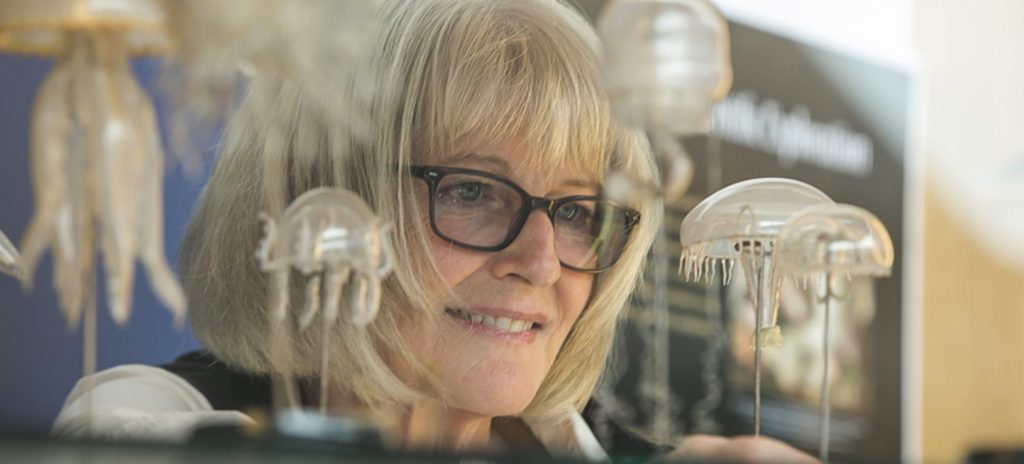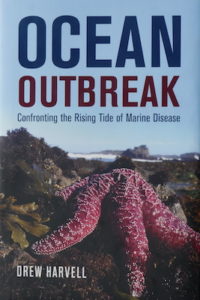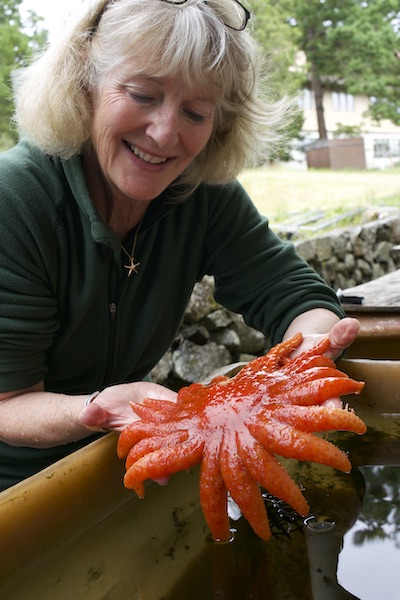
Dr. Drew Harvell with subjects of her 2016 book, Oceans of Glass | Jesse Winter
“In Wildness is the preservation of the world.” –Henry David Thoreau
It was Saturday, March 14, 2020, two days before the deadline for our Spring Island Dispatch newsletter. We Washingtonians, and the rest of the world, had just lived through a week that few of us could have previously imagined: The entire state and, increasingly, the rest of the country and the world were in lockdown to limit the spread of COVID-19.
The day before, we’d announced the cancellation of all Preservation Trust guided outings and in-person meetings through April, when we will re-evaluate. We also postponed our Annual Meeting, which had been scheduled for May 9.

Dr. Harvell’s timely new book
Back in October, we were thrilled when Dr. Drew Harvell agreed to be our Annual Meeting speaker. Dr. Harvell, Professor of Marine Ecology at Cornell University, lives in Friday Harbor and does much of her research work at the University of Washington’s Friday Harbor Laboratories. Her latest book, Ocean Outbreak: Confronting the Rising Tide of Marine Disease, came out last year to widespread acclaim.
An intrepid diver and international microbe hunter, Dr. Harvell leads a network of scientists who travel the world to investigate outbreaks of infectious diseases in the world’s oceans. Her book describes how these scientific sleuths identify the culprits in a series of marine epidemics, from sea-fan coral disease in the Bahamas in the 1990s to the starfish wasting disease that swept the Pacific coast, including our own Salish Sea, in 2013-14. Ocean Outbreak reads like a true-crime thriller that resonates eerily with today’s headlines.
When we emailed Dr. Harvell to tell her we’d postponed our Annual Meeting, we asked if she would comment on the land-sea connection—the relationship, if any, between conserving land and mitigating marine infectious disease outbreaks. Here’s her reply:

With sunflower sea star at Friday Harbor Labs
“While some marine outbreaks, like sea star wasting, seem to be from an ocean-based infectious agent and we have yet to find any links to land, many ocean outbreaks are strongly influenced by what we do on land. A disease like the one currently affecting our eelgrass meadows is death by a thousand cuts. Severity of the disease is affected by what we do on land. Disease can be worsened by excess nutrients and toxins conveyed in groundwater and streams, and even a reduction in freshwater entering the ocean.”
In short, she wrote, “Our local conservation actions on land can contribute to ocean health.”
We look forward to hearing more of Dr. Harvell’s timely insights at our rescheduled Annual Meeting in late July (we hope!). Until then, stay well and enjoy spring’s beauty as it unfolds around us. Treasuring, protecting, and enjoying the solace and beauty of nature have never been more important.
